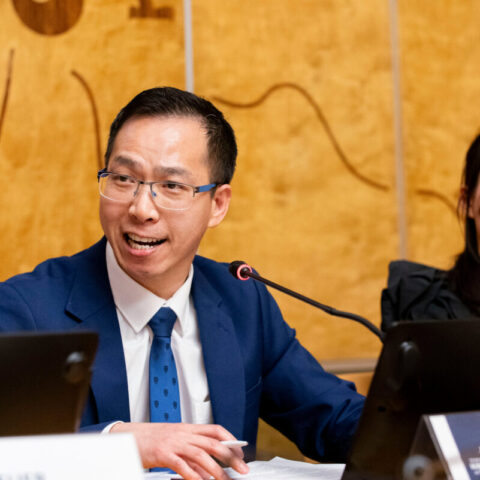Carolina Barrero, exiled Cuban art historian, writer, and human rights activist, addresses the 16th annual Geneva Summit for Human Rights and Democracy – see below for her remarks.
Full remarks:
I spent most of the year 2021 held under house arrest. The flat that became my prison was bugged with mics and cameras on the inside and guarded from the outside. I felt like a lab animal, observed by the vigilant eye of my captor. The regime wanted to understand my behavior: what I eat, when I sleep, when I cry or laugh. They wanted to understand so they could break me.
The Cuban State Security uses information as a weapon against people. They have created a vigilant state with eyes everywhere: neighbors, work colleagues, friends, family — everyone could be an informant or an agent of disinformation. The objective is simple: pitting one against another, so the corrupt elite in power prevails.
During my house arrest, the Ministry of Interior decided to prosecute me on charges including ‘clandestine prints’, instigation to crime, disobedience, and contempt. The operation included constant harassment, persecution, and smear campaigns. These are the consequences for advocating for civil and political rights inside the Communist Cuba.
This is familiar to many in the countries of the former Soviet Union; the same techniques used by the Stasi and the KGB are still working to spread fear and control. After the collapse of the Soviet Union, Cuba remained the keeper and supplier of totalitarian state techniques in Latin America, spreading its seeds across the hemisphere, where many countries, such as Venezuela, Nicaragua, and Bolivia, have suffered the consequences of its maligned influence.
The year 2021 witnessed the uprising of a citizens’ movement like no other in six decades of authoritarian ruling. The historic protest of July 11th breathed new life into our collective quest for a free and democratic country. It marked a point of no return.
At the end of January 2022, I was forced into exile with the threat of prosecuting the mothers of young Cubans condemned for sedition after July 11th. This occurred after we demonstrated together in front of the court during their sons’ trial. Cuban State Security thought exile would silence me. An attempt that backfired.
My message to you in Geneva, the seat of the UN Human Rights Council where human rights defenders have limited opportunities to speak compared to state representatives, is this: stop believing in the myth of the Cuban Revolution, in the truth of its good intentions, in its concern for the well-being of the vulnerable, in its capacity for honest democratic reform. It is evil in disguise, that would only use you to spread the seeds of tyranny.
Last week, Miguel Díaz-Canel, the appointee of Raul Castro, was in Moscow to celebrate the Victory Day. Side by side, he sat at the podium with Lukashenko. In the Kremlin, after the parade, Díaz-Canel wished Putin every success in the war against Ukraine, which he called the “military special operation,” using the words of Russian propaganda. The act was broadcast on the official Russian channels and abroad, sealing the Russian-Cuban alliance in the map of a global conflict.
The Cuban military has facilitated the recruitment of more than three thousand Cubans to fight against Ukraine. They enlist young men from the poorest parts of the country, often misleading them with promises of construction jobs described in vague terms. Before they know it, these young men find themselves fighting in the war. It is a scheme of exploitation in which the State uses the most vulnerable as cannon fodder. Disposable and deceived, they are just pieces in the geopolitical game of the dictatorship.
I want to be very clear: it is the regime that stands with Putin in this war. The oppressed people of Cuba, fighting against tyranny, stand with Ukraine. And since Díaz-Canel sent Putin his very best, I want to wish Ukraine every success and the final victory.
My call to action to you is to end hypocrisy and double standards inside international bodies. There should be no seat in the UN Human Rights Council for the most strategic ally of Putin in Latin America.
Know that Cuba is not represented by the members of the military elite who come to speak at the UN in the name of the people; rather, Cuba is its political prisoners, the exiled ones, the brave mothers fighting to put food on the table, the many who live in fear but in whose hearts freedom has started to bloom.
Thank you.
16th Annual Geneva Summit for Human Rights and Democracy, U.N. Opening, Tuesday, May 14, 2024




